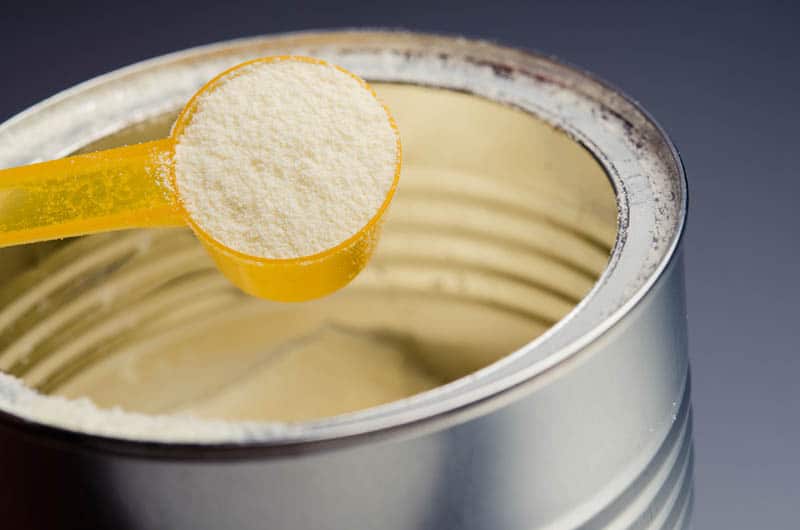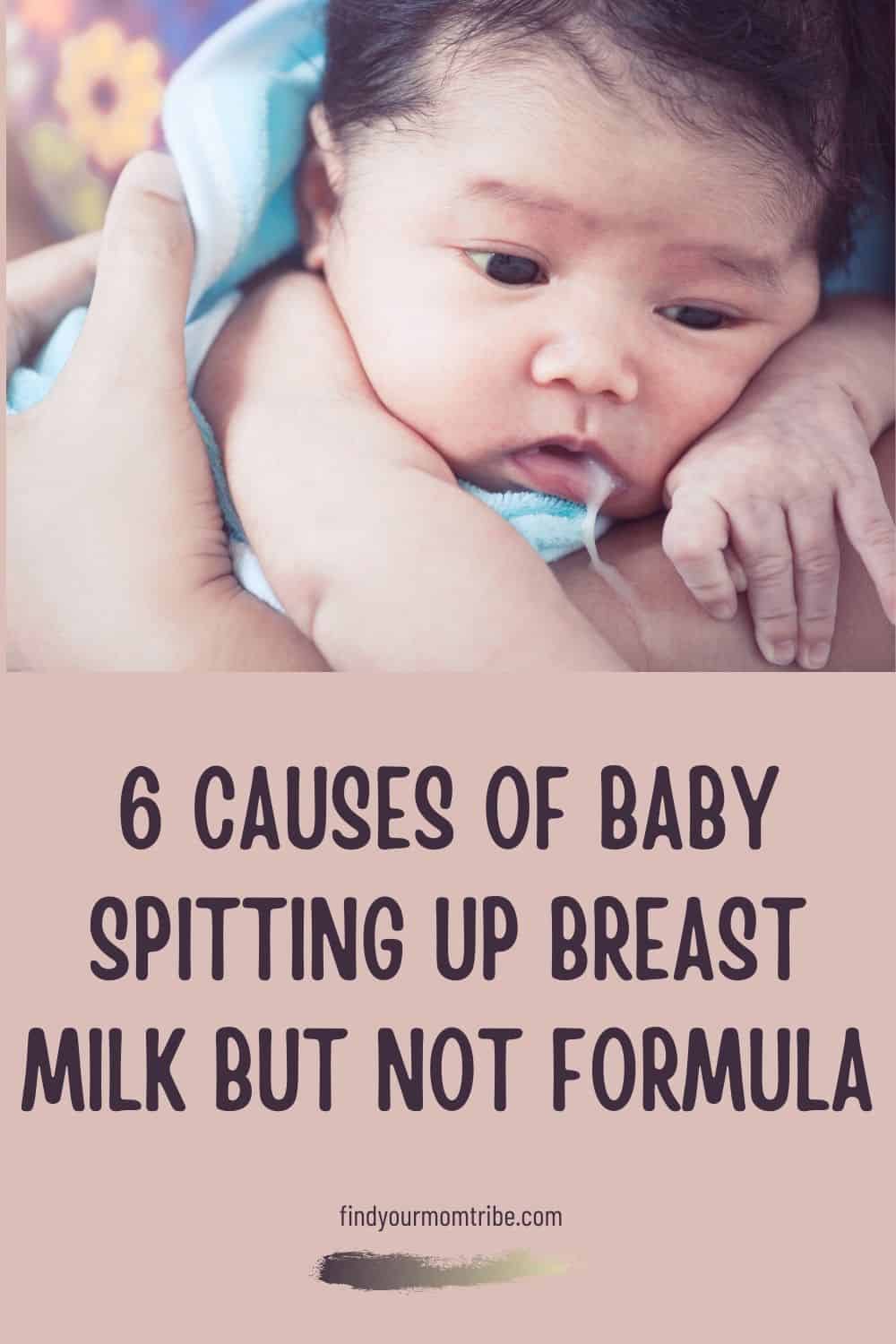Sometimes you’ll see your baby spitting up breast milk but not formula.
The primary reason for a baby spitting up breast milk but not formula is that formula is thicker than milk and therefore requires fewer feedings.
This lowers the number of instances where a formula-fed child could spit up in the first place, compared to a breastfed one.
The other reason is that bottles are less prone to “abnormalities” when the child suckles on them, as opposed to with a breast.
Bottles are made to certain standards and shaped in a mold, so whichever type you use will always be the same.
They offer extra levels of customization on top of all that as well.
Breasts come in all different shapes and sizes, though, and vary from mom to mom.
They can even vary from week to week during the breastfeeding period.
There could also be something in your diet transferring over to your breast milk that might disagree with your little one.
You could even be suffering from a bad case of breast engorgement, causing your nipples to go flat, so your child is having a hard time latching.
Anything is possible really, even a bit of newborn lactose intolerance could be the issue here.
Read on to find out the exact reasons for your problems, and the solutions to them.
Why Is My Baby Spitting Up Breast Milk But Not Formula?

There are plenty of reasons your baby might be spitting up breast milk but not formula.
Here are some of the chief suspects:
1. The contents of the formula are always the same
This is almost certainly one of the main reasons. Baby formula has to adhere to certain quality standards, which means the nutritional values must always be the same.
Breast milk, however, is a completely different ball game.
Certain foods can affect the flavor or texture of breast milk, and how well your baby digests it, and because this milk is made by Mother Nature, it’s never exactly the same, at least not in the same way we consider formula to be.
2. Breastfeeding sessions vary more in comparison to bottle-feeding

If you’ve been exclusively breastfeeding while only using bottles for formula feedings, this might also be the cause of your baby’s digestive problems.
The shape of a breast can vary a lot more than a baby bottle.
While a mother’s breast is a wonderful tool for providing all-natural nourishment to the child, while also ensuring he stays in the warmth of his mother’s body and gets to listen to the familiar sound of her heart beating, it can also be a real nuisance at times.
Breasts are prone to many issues, which can be a real pain, both figuratively and literally.
Clogged milk ducts and mastitis come to mind first as the two most annoying things a mom has to deal with when she breastfeeds.
After that, you have nipple soreness and nipple cracking, which are more of an issue for you than a factor in your child’s spit-up frequency.
The potential problems for your baby are foremilk/hindmilk imbalance, which throws off the feeding balance in breastfed babies, resulting in them not feeling full despite the fact they are, and spitting up more often as a result.
This happens if they get a bit too much of the non-fatty foremilk because the hindmilk is stuck in the back and never gets to the baby to satisfy its hunger, often leading to spit-ups or vomiting.
Forceful let-down is another big factor for women who are going through a milk abundance problem, something that usually comes as a surprise to the baby when he gets used to the normal milk flow.
The baby will try to keep up with the pace and start gulping, but it can end up being too much, so he ends up gagging and spitting up.
This happens because the baby’s stomach is unable to retain that much when he’s only a few months of age.
The final problem relating to the breast is engorgement.
Breast engorgement can happen either due to an excess milk supply or an allergic reaction, but the symptoms are the same regardless and often lead to a wider and flatter nipple, which is a lot harder to latch onto.
This will often cause your child to swallow a lot of air alongside the milk and, when these pockets of air burst inside, it can push the other stomach contents right back up the esophagus to make him spit up.
3. Your child’s digestive system isn’t fully developed yet

While not an issue that affects all children, it’s still a very common one.
The most prevalent issues are infantile lactose intolerance, which may or may not persist for the entirety of your child’s life.
Although, in most cases, it fades shortly after your child’s first birthday, when his digestive system develops enough to take solid foods on.
The other issue is gastroesophageal reflux disease (GERD).
GERD is a condition where an underdeveloped lower esophageal sphincter muscle is too weak to keep all of the stomach contents down.
This can cause quite a stir in your little one’s digestive system for the first 12 months of his life, after which it normally clears up.
A small percentage of children must undergo corrective surgery in order to fix it.
4. General food sensitivity
Of course, it’s not just milk that your child could be intolerant to, he could have other food sensitivities, like intolerance to onion, garlic, or peppers, for example.
RELATED: Can Babies Have Garlic And What Are Its Health Benefits
He may not have these things in his diet, but you might, and they can end up transferring from the milk right to your baby’s digestive system, creating the irritation that causes the spit up.
5. Overfeeding

You might be overfeeding your baby when breastfeeding him.
Sudden changes in pressure may lead to you accidentally giving your child a bit more than he can swallow.
Breastfeeding is often challenging for new parents in this regard, as there’s no exact measure of how much milk your kid has drunk.
Sometimes children can’t control their appetite and continue suckling away, which leads to overfeeding and the subsequent regurgitation of the excess.
6. Teething (not exclusive to breastfeeding)
The final cause can be teething. As your little child’s teeth start coming in, he’ll be experiencing a lot of irritation in his gums.
It could cause him to pull away from the breast for a moment before returning back to it.
This often traps pockets of air in between gulps which, when burst, cause some of the milk to rise back up the esophagus and make your baby spit it up.
It’s worth noting that this can also happen with baby formula, although formula is thicker, leaving less room for air to get trapped in between.
Why Does Formula Not Have These Problems?

The reasons for the mother’s milk are clear enough, but how exactly does formula manage to avoid these issues, which cause parents to ask: “Why is my baby spitting up breast milk but not formula?”
Well, hopefully, some of these will help clear that up:
1. The formula requires fewer feeds per day
Due to its higher nutrient content, baby formula can provide the equivalent amount of a day’s worth of breastfeeding in fewer feeds, reducing the number of instances in which spitting up can occur.
2. The formula is consistent
As mentioned at the start, formulas are made to be sold and are tailored for a wider spectrum of children, meaning that they have to pass rigorous quality tests and have very specific ingredients.
This ensures consistency, and that children with specific food allergies can find a formula suited for them and consume it with no fear of getting an upset tummy or more severe allergic reaction.
Breast milk, on the other hand, depends on your diet.
Unless you’re always eating the same exact thing day in and day out it is always going to vary. This makes the quality of your milk vary as well.
It’s by no means bad, it just might trigger an allergy or intolerance in your child.

3. Baby formula is thicker in comparison
You might not think this is a factor, but thicker foods are less likely to have your child swallowing air during a feed as there’s less room for it to be trapped.
This reduces the chances of air bubble-based spitting up from happening and allows your little one to keep most of his food down with little issue.
4. It’s always fed through bottles
While this last one isn’t exclusive to formula, considering milk can be pumped and bottled just as well, it is a unique benefit in that you are able to measure exactly how much you are feeding your baby.
This opens up the opportunity to properly portion feeding sessions and lower the risk of overfeeding your baby.
Does This Mean That Baby Formula Is Better Than Breast Milk?

If you’ve seen your baby spitting up breast milk but not formula, you might be wondering whether formula is actually better than breast milk.
When all is said and done, breast milk will always be the superior option simply because it’s completely tailor-made for babies and comes directly from the mamma.
Modern technology and manufacturing practices can try to mimic it, but right now there is no formula on the market 100 percent identical to human milk.
That said, how you feed your baby is your choice. There’s no shame in feeding your baby formula.
All that matters is that your baby is healthy and full.
Formula does have some distinct advantages over human milk, though.
It’s great for moms who have trouble with insufficient milk production, which can happen for various reasons, and need to supplement with formula.
It’s absolutely lifesaving for children who’ve developed an allergy to milk protein, or some other food, very early in life.
It’s also a great substitute if you’re a working mom and the babysitter/your partner has run out of bottled milk to feed to your child, or you simply don’t have the time or the energy to breastfeed anymore.
Plus, conditions like colic can affect both breastfed and formula-fed babies, so it all really comes down to finding the way to feed your baby which works best for your family.
Don’t feel pressured to follow trends or the advice of others. Talk to your doctor and express any concerns you may have about your baby’s nutrition.
How To Reduce The Chances Of Spit Up Occurring With Breast Milk

Spitting up isn’t all that dangerous, but it can be a real nuisance for both you and your child to deal with.
Thankfully, there are plenty of ways to minimize the chances of it happening in the first place.
Here are a few of the most effective ones:
1. Frequently burp your baby
Burping can be a real lifesaver. It helps get rid of all the excess air your child swallows during a feed in a safer manner and helps ease the tension around your baby’s belly.
Make sure to burp your baby after every feed.
Oh, and make sure you have a burp cloth ready, as sometimes it can get a bit messy and you don’t want to ruin your clothes!
RELATED: How Many Burp Cloths Do I Need? 12 Best Burp Cloth Picks
2. Ensure your baby has a proper latch

A proper latch is paramount in reducing the odds of your child regurgitating his food because it minimizes the amount of air he swallows.
Always make sure your nipple is right in front of the child’s mouth to give him easier access to it, and keep your eyes peeled for any clicking sounds, which are a telltale sign he’s having problems latching onto your breast.
3. Keep your child in an upright position after a feed
Keeping your baby upright for at least 30 minutes after a feed ensures the contents are kept down and that they pass through your kid’s digestive system properly.
4. Express milk before a feed if you’re suffering from breast engorgement/oversupply
If you want to avoid your baby overeating make sure to massage your breasts or express some milk before a feed.
Don’t go too far though, leave some for the baby and only express as much as is needed to revert the nipple to a more natural shape or relieve any pain you might be feeling.
5. Make sure there’s no pressure around the baby’s waist
Check what the baby’s wearing, if the elastic waistband of the diaper or a shirt are too tight around the abdominal area, loosen them up a bit or lower/raise them so it doesn’t apply too much pressure.
The same goes for any active instances of tummy time and anything else that might put strain on your child’s belly.
Make sure to avoid any exercise for at least 30 minutes after a feed to let the food settle properly first.
6. Promote active play

In order to avoid having a baby’s spit up become a problematic experience, and your child turning into a happy spitter, make sure to have him do some baby exercises as well, but only after the initial 30 minutes post-feed have passed.
This will not only help with muscle development but also with pushing out any excess air your burping session might have missed, relieving any discomfort your child might still be feeling in his tum-tum.
7. Regulate your own diet
If the issue stems from a specific food you might have eaten, try locating the culprit and eliminate it from your diet.
While it might take some time for it to completely clear out of your system, your child will have a much better time feeding afterward.
8. Seek advice from your pediatrician or lactation consultant
The best piece of advice I can give you with anything concerning general health and medical problems is to go to your child’s doctor or your lactation consultant (IBCLC).
They’ll be able to properly diagnose the root of the issue and give you accurate health information on how to handle it.
They’re the professionals in the field and their word means more than mine or anyone else’s, no matter what credentials you see presented online.
Plus, they can perform a hands-on diagnosis, which nobody else on the internet can do, giving you a more accurate assessment of the potential problems you or your child may have.
Never disregard their opinion in favor of something you see online, the doctors only have your best interests in mind, after all.
In Conclusion

Many moms are concerned about their baby spitting up breast milk but not formula, even though they really shouldn’t be.
The act of spitting up is completely normal after all, even in healthy babies.
It’s the aftereffect of an undeveloped digestive system and the factors of variance in breastfeeding.
It’s not a concern most of the time, but if it starts happening a bit too often, it would be wise to seek advice from your family doctor, pediatrician, or any other qualified healthcare professional on the matter.
Sometimes the solution can be as simple as correcting your breastfeeding position, but it might also result in you having to switch over to formula due to allergies or other issues.
It might feel disheartening at first, but no matter what some people might say, baby formula is still just as natural as breastfeeding because it’s natural to put your child’s well-being over personal comfort.
Sure, you might miss out on some skin-to-skin contact, but your child will be healthier for it and you’ll be preventing the discomfort of frequent spitting up, as well as ensuring he gains the proper amount of weight for a young child.
So don’t let peer pressure get to you, mamma.
Make the decision that’s right for your child, and not the decision that others might be forcing you to make. I know you’ll make the correct one.
Until next time, mamma!
Like this post? Please share or pin it for later. You can also stay in the loop and follow us on Facebook, Instagram or Pinterest.

We love honesty! Find Your Mom Tribe is an Amazon Associate and we earn from qualifying purchases through affiliate links at no extra cost to you. Please see our full Amazon Affiliate disclosure for more information.

